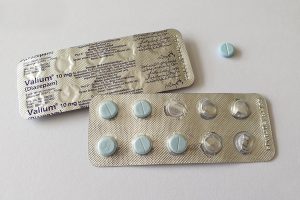Valium is a habit-forming substance used to treat seizures and anxiety. If you find yourself losing control over this medication, then it is a concrete sign that you have established physical dependence on the drug. By giving in to these cravings, you can most likely develop a level of addiction.
Valium, classified among benzodiazepines, is also a popular target of individuals seeking to get high. Its calming nature is too enticing to cover up mental health problems or enjoy a pleasurable moment. With prolonged use, Valium can lead to severe addiction, especially among those who use it without any medical cause.
The Diagnostic and Statistical Manual of Mental Disorders, 5th edition, lists 11 criteria to classify a person’s level of substance use disorder. Whether you belong in the mild, moderate, or severe category, the only way to recover is through treatment and that begins with detox.
Recognizing Valium Addiction
 Valium addiction hurts both your physical and psychological state.
Valium addiction hurts both your physical and psychological state.
When you get caught into addiction, the trouble of constantly seeking the drug becomes part of your life. Consequently, your relationship with your work and the people around you will be compromised in the long run.
The following can tell you that you are suffering from a substance use disorder and you need to start planning for detox care:
Constant cravings for the drug
This is when your day is filled with nothing but thoughts about using the substance. You worry about not getting any chance to take the drug or running out of your supplies. You can’t wait for your next dose and you fall into giving in to your constant cravings.
Lack of restraint for drug use
You may be aware of the negative consequences that the drug has brought into your life, but you extremely struggle in putting yourself to a stop. It turns out that you no longer have control over your drug use.
Isolation from loved ones
You find yourself always in a rift with families and friends especially those who share sentiments about your drug use. You hate engaging with a crowd and prefer to be alone, seriously thinking about your cravings and your drug use.
Neglect of responsibilities
You find it hard to connect with your responsibilities at work or even at home, and you can’t see the meaning of doing these things. You tend to pull yourself away from accomplishing tasks and this disrupts not only the quality of your work but also your relationship with others.
Detachment from amusement
You no longer enjoy the things which usually matter to you. You detach yourself from your hobbies and from anything which can be amusing. Sometimes you realize how awful it feels but you can’t seem to do anything about it.
Experience of withdrawal
You are likely to suffer physically or psychologically when you miss a dose. Sometimes when you have been excessively using the drug, your body develops tolerance and your usual dose fails to satisfy you. You seek for more without realizing that you are already intoxicated.
Symptoms of Valium Addiction
Apart from all the changes of behavior that others can detect from your actions, you can tell that your dependence on the drug is significantly increasing when you experience the following physical and psychological symptoms. You have to also watch out for symptoms of overdose since this can be life-threatening.
Physical symptoms
Addiction to the substance can cause you to experience low blood pressure and dizziness. Extreme doses can even lead to seizures and respiratory depression. Typically, most people experience one or more of the following symptoms:
 Blurred vision
Blurred vision- Dry mouth
- Slurred speech
- Loss of appetite
- Body pain
- Nausea or vomiting
- Tremors
- Painful urination
Psychological symptoms
Your mental health and behavior are negatively affected once addiction has already occupied your brain. Since Valium tends to sedate you with its effect, you may find trouble coordinating your motor skills and even find yourself oftentimes disoriented. Driving can be a dangerous task under Valium addiction.
The following are the psychological symptoms that you will experience with Valium abuse:
- Anxiety
- Irritability
- Agitation
- Insomnia
- Paranoia
Depression and hallucination are possible and these conditions need to be immediately attended to since they can lead to life-threatening actions.
Symptoms of overdose
Overdose is fatal, although death rarely occurs with Valium abuse. Severe conditions that indicate overdose include having trouble breathing, inability to balance body movement, and floppy conditions of the muscles. Low blood pressure is also a strong indicator.
When these things happen, you need to seek medical help immediately. Suffering from overdose can cause coma and death.
Withdrawal and Treatment
 When you realize that you may have suffered some of these symptoms, then consider a detox. Detox is the initial phase of your treatment, and it can be extremely challenging.
When you realize that you may have suffered some of these symptoms, then consider a detox. Detox is the initial phase of your treatment, and it can be extremely challenging.
When you begin to get rid of a drug that fuels the normal function of your body, this system suffers from a disruption when you detox and your body reacts negatively by making you experience withdrawal symptoms.
Medically supervised treatment can help a lot in managing your withdrawal symptoms. It alleviates your pain and controls your cravings, preventing you from experiencing a relapse.
Since most people take Valium to control their anxieties, it is also a common thing to experience rebound anxiety. But with the help of your physician, the condition can be less intense.
Typically, a taper schedule and the use of medication can make the detox experience less uncomfortable. These can also be done in conjunction with therapy sessions.
The role of medical experts is essential during treatment. Before detoxing, have yourself assessed first so that you can decide on a treatment option that can truly satisfy your needs.
Every detox experience is different for every person. The duration and degree of your substance use can affect the length and intensity of your treatment. If your addiction is severe, going for an inpatient detox is your safest and best option.
It is best to work with a team of health professionals to guarantee your detox care is safe and effective.
